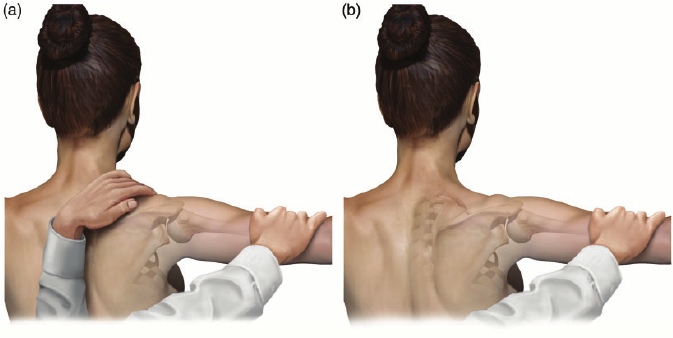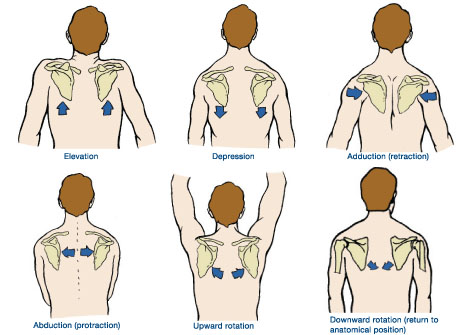
The shoulder blades are a highly important part of the human body, as they allow us to perform some of the simplest movements, such as eating, brushing our teeth, and certain sports-related movements. Therefore, if you experience shoulder joint pain or back pain, it might be a good idea to start training the muscles around your shoulders. Scapular retraction and scapular protraction exercises are a great place to start. We recommend speaking with one of our sports medicine professionals for guidance on the correct movements, or to take part in a D1 sports training program.
At SPORT Orthopedics + Physical Therapy, we offer a wide range of treatments for all sorts of sports injuries, chronic pain, and scapular dyskinesis. Training the muscles of the shoulder joint with the help of an experienced physical therapist in Dallas is a simple and effective solution. If you want to eliminate shoulder pain, improve your range of motion, and provide additional support for the spine, contact SPORT today. To schedule an appointment with us, please call 469-200-2832 or fill out our online intake form. Our back specialist in Dallas will help you understand the cause of your pain or stiffness.

Scapular retractions are those exercises that require you to pull the shoulder blades together toward the spine. However, the shoulders do not move upward toward the ears in these types of exercises. These movements focus specifically on improving the integrity and strength of the muscles around the shoulder blades.
It also aids in the improvement of your posture, which can help with a multitude of problems, such as back pain and shoulder pain. The muscles involved in scapular retraction are the upper trapezius, middle and lower trapezius, rhomboids, and latissimus dorsi.
Also called abduction of the scapula, this is when the scapulae move laterally away from the spine. It is essentially the opposite of scapular retraction. The muscles involved in shoulder abduction are the serratus anterior, pectoralis major, and pectoralis minor.
The scapulae, or shoulder blades, are bones rather than muscles. They are surrounded by important muscles in the back which support the upper spine. Although scapular retraction is a small, simple movement, it is an extremely important one. The benefits of these exercises are numerous in that it enhances almost all of the upper back muscles and exercises.
While it does help to strengthen the upper back, it also helps to warm up the muscles in preparation for upper body training. The last benefit, but certainly not the least, is that it aids with connecting your mind and your muscles. It’s important to focus on proper movements in scapular retraction, so we recommend seeing a physical therapist to help ensure that your movements are correct.

Scapular retractions involving a resistance band are highly effective as warm-ups that can help you focus before you begin more rigorous exercises. They also help to strengthen your middle and upper back muscles.
These are a bit more challenging than band scapular retractions, as it requires the use of your whole body weight.
Static stretches are not the same as dynamic stretches. Stretches that are dynamic are designed to get the body moving. The stretches aren't sustained for long periods of time. Lunges with a torso twist are examples of dynamic stretches. Static stretches, on the other hand, include extending and holding muscles for a length of time. The triceps stretch and the butterfly stretch are two examples of static stretches.

The scapular retraction test allows a physician to move a patient’s scapula in a way that allows them to examine the integrity of the rotator cuff. Below, we outline the steps of the test.
If the scapular retraction test improves the strength of the supraspinatus muscle, physical therapy will then focus on improvements to kinetic chain function and improving scapular stability. However, if the strength of that muscle does not improve, then further assessment of the rotator cuff is needed.

The scapula is an extremely important bone in the body which allows for multiple types of motion. These types include protraction, retraction, elevation, depression, upward rotation, and downward rotation. This enables us to have a fully functional upper extremity area.
The serratus anterior, pectoralis major, and pectoralis minor muscles are responsible for protraction. The trapezius, rhomboids, and latissimus dorsi muscles are responsible for retraction.
Trapezius, levator scapulae, and rhomboid muscles are responsible for the elevation. Gravity and the activities of the latissimus dorsi, serratus anterior, pectoralis major and minor, and trapezius muscles combine to cause depression.
The trapezius and serratus anterior muscles are responsible for upward rotation. Gravity, and the latissimus dorsi, levator scapulae, rhomboids, and pectoralis major and minor muscles, assist in downward rotation.

At SPORT Orthopedics + Physical Therapy, we understand the importance of healthy shoulder muscle activity. When your shoulders or back are in pain, it’s difficult to complete even the simplest of daily activities. That’s why we’re here to get you back on your feet and back in the game. To speak with a Dallas orthopedic specialist or to schedule physical therapy in Dallas, please contact our office. Call today at 469-200-2832 or fill out our online intake form.









*We accept most all insurance plans, if you do not see your plan listed above or have any questions, please contact our office.

SPORT Orthopedics + Physical
Therapy – Dallas, TX
Services:
• Clinic • Orthopedic • Urgent Care
• Physical Therapy
18152 Preston Road
Suite I-2
Dallas, TX 75252
Phone: (469) 200-2832
Fax: (469) 269-1074
SPORT Orthopedics + Physical Therapy – Frisco, TX
Services:
• Clinic • Orthopedic • Urgent Care
• Physical Therapy
9255 Dallas Parkway
Suite I20
Frisco, TX 75033
Phone: (469) 200-2832
Fax: (469) 269-1074
SPORT Orthopedics + Physical
Therapy – Wylie, TX
Services:
• Clinic • Orthopedic • Urgent Care
• Physical Therapy
3400 FM 544
Suite 650
Wylie, TX 75098
Phone: (469) 200-2832
Fax: (469) 269-1074
SPORT Physical
Therapy – Prosper, TX
Services:
• Physical Therapy
790 N Preston Rd
Suite 60
Prosper, TX 75078
Phone: (469) 850-0201
Fax: (469) 269-1074
SPORT Orthopedics – Mesquite, TX
Services:
• Clinic
• Orthopedic
• Urgent Care
1102 North Galloway Ave
Mesquite, TX 75149
Phone: (469) 200-2832
Fax: (469) 269-1074